#i named tommy after tommyguns
Text
Week 10 on the Island
Blake, after spending time with magical orphan: "I have decided to adopt this child. I named him Tommy."
Tommy, a magical cat (teenaged in magical cat years): *waves*
Yang, understanding, having long accepted this will be her life: "Never thought i would be a mom this early. Blake, as your wife, I shall join you in raising Tommy."
*Bees Kiss*
...
[Across Hypertime]
Taiyang, feeling joy in his chest: "My fatherly instincts tell me Yang is alive, and also I am now a grandfather. Never thought it would be this soon...."
Taiyang, getting his tools: "Time to babyproof and renovate."
#bumbleby#yang xiao long#blake belladonna#taiyang xiao long#rwby#rwby spoilers#i named tommy after tommyguns#the guns#you know#writing mode
49 notes
·
View notes
Text
Superman Misses the Point
One of the frustrating things about being interested in old or otherwise obscure media is that sometimes, somebody will popularize a really bad take on that thing, and it's hard to critique or even just complain about the bad take because too few people are familiar with the original. This extends to insulting homages (e.g., the loathsome THRILLING ADVENTURE HOUR, of which the less said the better), offensive pastiches (e.g., Tom King's horrific MR. MIRACLE comic), and misguided remakes and adaptations of various kinds.
I regret to say that one of the latter is this much-praised 2019–2020 miniseries by Gene Luen Yang and Gurihiru:
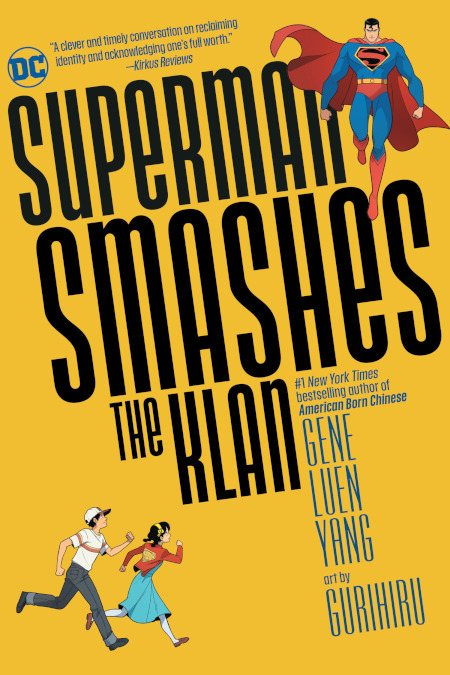
This story is an adaptation of perhaps the most famous storyline of the 1940s ADVENTURES OF SUPERMAN radio series, "The Clan of the Fiery Cross," originally aired on the Mutual network in June–July 1946. It also borrows a big chunk of another famous radio storyline, "Superman vs. the Atom Man," originally broadcast between September and December 1945. I use the word "famous" advisedly because the number of people who have heard OF these stories exceeds by a considerable margin the number of people who've actually HEARD them, although all episodes of both storylines survive, and the "Atom Man" story was released some years ago on CD and cassette with a nice booklet about the history of the Superman radio show.
Yang HAS clearly listened to both radio storylines, and his essay "Superman and Me" (included as an afterword in the trade paperback version of SUPERMAN SMASHES THE KLAN) gives a pretty good overview of the context of the "Fiery Cross" story.
In SUPERMAN SMASHES THE KLAN, he directly adapts some parts of the radio stories while making some significant changes to others. Some of his changes are improvements, but some are not, and ultimately serve to rather badly undermine the point of the original storyline.
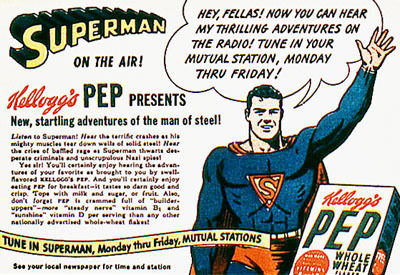
It's unfortunate because "The Clan of the Fiery Cross" is one of the most potent of the numerous pro-tolerance stories presented in the ADVENTURES OF SUPERMAN radio series during this period. It followed only a few weeks after a 25-part serial called "The Hate Mongers," and was followed over the next two and a half years by, among others, "George Latimer, Crooked Political Boss" (in which a right-wing political fixer orders state troopers to turn tommyguns on a crowd of veteran protestors and then frames a Jewish veteran for attempted murder); "Knights of the White Carnation" (about another hate group murdering people in Metropolis); and "The Man Without a Face" (about an escaped Nazi war criminal trying to eliminate a young concentration camp survivor who's the only one able to identify him).
What makes "Fiery Cross" stand out is that it really doesn't pull a lot of punches. Some of the radio show's other storylines of similar bent are very cautious; they criticize prejudice against someone "of a different race" rather than saying "Black" or "Chinese," and "goes to a different church" rather than saying "Jewish" (even when that's what they mean), which ends up kind of blunting the point. By contrast, the Clan of the Fiery Cross is plainly meant to represent the KKK, both through references to Klan rituals (apparently courtesy of information provided by reporter Stetson Kennedy) and in the things they do, which include burning a cross on a Chinese family's lawn and attempting to tar and feather their kid! There's not a lot of hedging except in the name of the organization, which wasn't fooling anyone.
To explain how Yang's treatment of this story goes sideways, it's necessary to explain some finer points about the storylines, including the endings of the two versions, so I'll put that behind the cut.
The basic premise of the radio storyline is that young Tommy Lee, a Chinese-American high school student who's also a pitcher on the baseball team of Unity House (an interfaith youth center that figures in a number of radio storylines), becomes a target of the Clan of the Fiery Cross for two reasons: an innocent accident involving another player, a loudmouth named Chuck Riggs whose uncle Matt is secretly the Clan's Grand Scorpion, and the fact that Tommy's father, a well-known bacteriologist, has just taken a well-paying new job with the city health department that another Clansman, Jennings, had expected to get as a political favor.
After terrorizing the Lees, most of the Clan's "action committee" is captured by Superman and arrested, whereupon the now-unmasked Clansmen immediately begin squealing on one another. However, Matt Riggs manages to escape, and goes to find the Clan's "Grand Imperial Mogul," Segret (or Cedric) Wilson, hoping to call in reinforcements from the Clan's national organization.
This leads to the radio storyline's arguably most provocative point: Wilson reveals that the Clan of the Fiery Cross is really just a pyramid scheme, raking in millions by giving thousands of rubes someone else to blame for their own failings, which means true-believer Riggs is both a sucker and a liability. Wilson nearly shoots Riggs, who kills him instead.
In SUPERMAN SMASHES THE KLAN, there's a similar confrontation between Riggs and Wilson, but with a significantly different upshot:
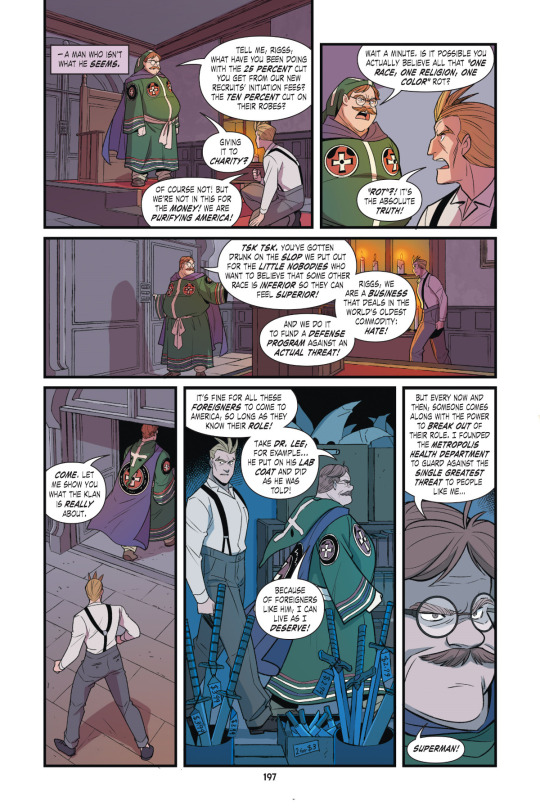
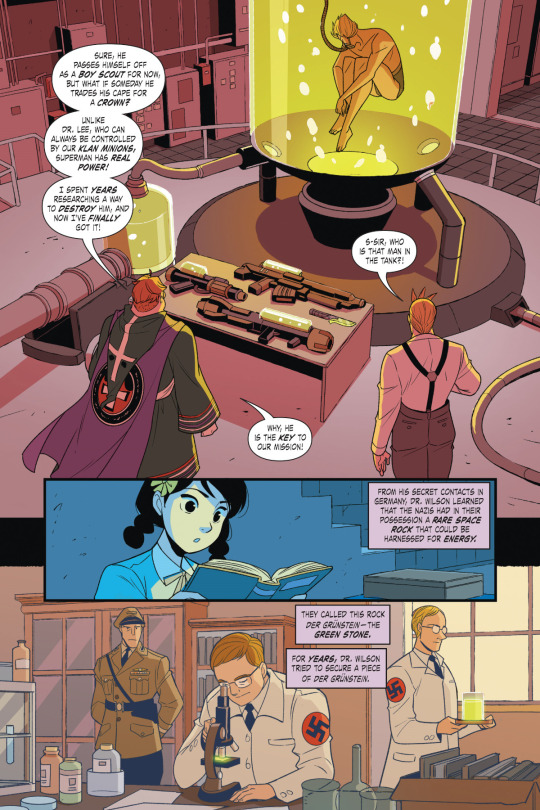
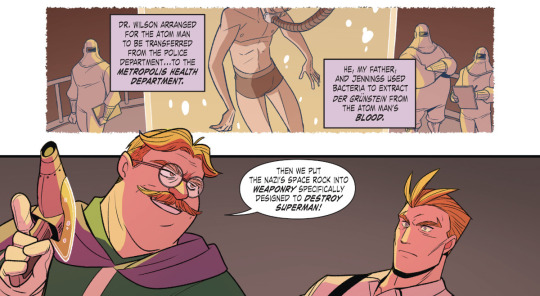
So, rather than a more or less real organization with a credible (if reprehensible) goal and all-too-real methods, the comic suddenly becomes about making super-weapons to fight Superman, taking a hard swerve from reality to fantasy.
I should note here that part of what Yang has tried to do with his adaptation of this story is to make the point that Superman himself is an immigrant. That's something the radio series does NOT do and that Superman media in general has mostly gone out of its way to avoid, sometimes in really distasteful ways, but it is a natural enough move in a story like this. Yang's strategy for accomplishing that involves some major departures from the radio continuity that I find jarring, but that's a complaint rather than a critique.
The problem, as I see it, is that when you're talking about immigration, racism, and racial violence, making it ABOUT Superman kind of loses the plot. Superman is a character who doesn't have any real-world analogue: He's a super-powered man from another planet who does impossible good deeds on a daily basis. Even to the extent that he is "real" within the context of these stories, a) he is for all intents and purposes a white man; b) he is never going to be in any really serious physical danger, due both to his powers and plot armor; and c) he consistently upholds and defends the status quo in useful, dramatic, public ways. Thus, Superman's experience as an immigrant is never going to be remotely comparable to the experience of immigrants of color and their children, and suggesting that it would be is honestly kind of insulting.
Additionally, the way modern comics and comics-based media try to create straw man arguments about mistrust of Superman is more than a little ridiculous. As presented in the radio show, Superman would be capable of laying waste to Metropolis in a matter of hours, and there wouldn't be much anybody could do about it; the fact that Superman is always selfless and always trustworthy (and that you can always safely assume he's selfless and trustworthy) is really the most fantastical aspect of the whole mythos. It's perfectly reasonable for people to be nervous about Superman, and the assertion that only Bad People would be uncomfortable about his unchecked personal power does not bear close analysis even within the dubious politics of superhero stories.
Anyway! Returning to the radio storyline: After killing Wilson, Matt Riggs returns to Metropolis, where he tries to convince his rapidly dwindling pool of cronies to help him murder Tommy Lee, Jimmy Olsen, and his own nephew so they can't testify against the Clan or Riggs. In the climactic sequence, Superman captures Riggs at a Unity House-Metropolis High baseball game just in time to prevent Riggs from shooting the three boys with a high-powered rifle. Riggs at this point in the story doesn't have any grand scheme other than not getting caught and silencing witnesses who could send him to prison; I imagine if he succeeded in that, his next step would be to turn on his fellow Clansmen for chickening out, but he obviously hasn't thought that far ahead.
In SUPERMAN SMASHES THE KLAN, Riggs instead shows up at the baseball stadium in full Klan regalia, unmasked and armed with Kryptonite-powered weapons to fight Superman, whom he publicly "outs" as both an immigrant and an extraterrestrial:
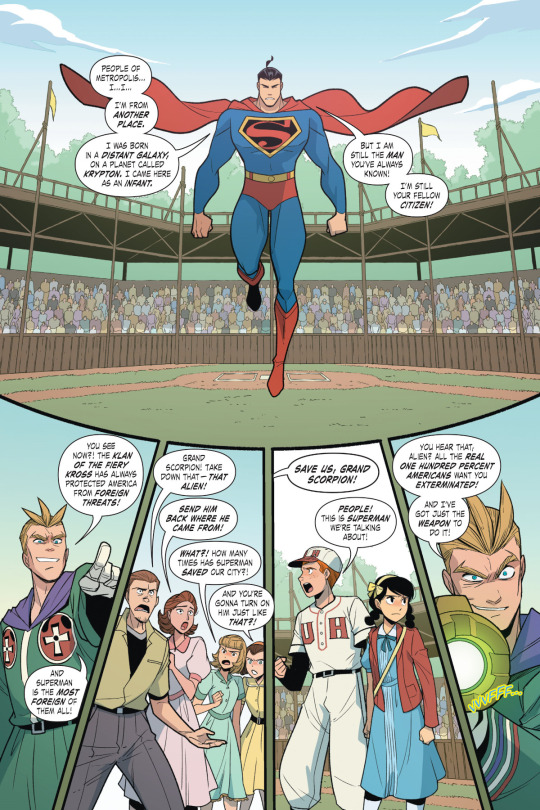
After using his Kryptonite-powered weaponry to knock Superman around for a few pages, Riggs reveals that he's wearing an explosive vest and intends to martyr himself to make Metropolis pay for harboring Superman, or something:
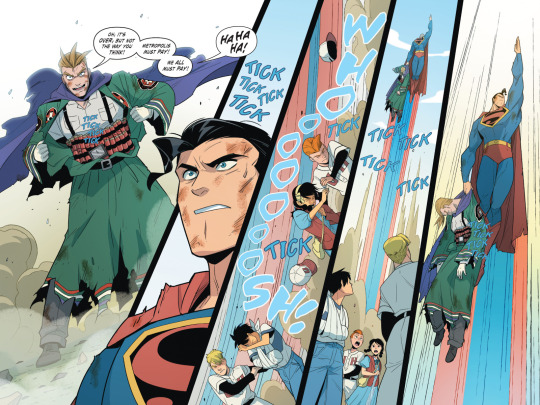
After Superman destroys his explosive vest, Riggs stabs Superman with a Kryptonite knife, but Superman manages not to drop him, so Riggs survives to be arrested. Afterwards, Metropolis embraces Superman's immigrant status, and the Lee family lives happily ever after.
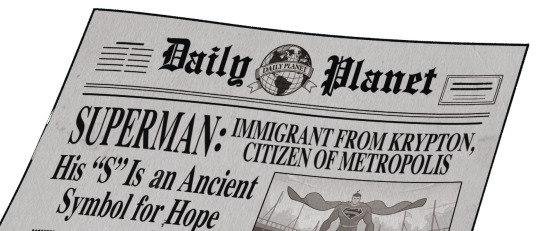
(There's a cute coda with Lois Lane offering Tommy Lee's younger sister Roberta a cub reporter job with the DAILY PLANET.)
I'm trying hard not to kvetch too much about the various departures from the radio continuity (for instance, in the radio show, Superman being from another planet was already public knowledge by the time of this story, and in fact, Lois revealing that information in a DAILY PLANET story directly precipitated the whole Atom Man saga!), which I don't love, but which I'm willing to accept as Yang's authorial prerogative.
However, I can't help but regard the revised ending as a real weakening of the original radio storyline. The radio story is not ultimately about Superman; he functions mainly as a plot device. It's about how a vicious white supremacist nearly causes a great deal of harm before learning that even his own white supremacist superiors consider him a deluded sucker who's only useful as a revenue-generator, and who in the end probably goes to prison for attempted murder, discredited and shunned even by his erstwhile brethren. In making the story ABOUT Superman, Yang ends up validating Riggs and the Klan in a way I'm certain he did not intend; the villains now have a "real" plan (raising money to protect Metropolis and America from the threat of Superman), and Riggs gets to make a big speech that will probably win him more support even if he ends up in prison.
The damage Yang's changes do to the intent of the story goes beyond that to weaken the basic logic of the plot. In the radio storyline, there's nothing sinister about the health department or Dr. Lee's job; he's singled out because a Clan member, Will Jennings, wanted his job (which Jennings later admits he wasn't actually even qualified for). In the comic, Jennings is Lee's coworker and one of Wilson's cronies in the secret plot taking place in the health department basement (in which Dr. Lee is an apparently unwitting pawn). If Wilson himself hired Lee and Lee was contributing to his scheme, knowingly or not, why have the Klan burn a cross on his lawn? I think we're supposed to read it as Riggs being a loose cannon, but if Wilson is right there and Riggs' actions are messing with the plan, why wouldn't he rein him in sooner? (In the radio storyline, Wilson lives in another state, and until Riggs shows up at his door, he hasn't been directly involved in anything that's been going on except presumably to cash checks.)
Not only does this make little sense, it undermines a recurring theme of this and the other anti-bigotry radio stories: that bigotry is often tied to, if not driven by, mundane material concerns, whether it's wanting to control who gets cushy state jobs (as in the "George Latimer" storyline) or jealousy over a desirable job or a position on a team. THAT is all too real, and not a bad lesson for a radio show like THE ADVENTURES OF SUPERMAN.
Yang injects a heavy dose of feel-good uplift to the end of his version, but it leaves me wondering what the point was supposed to be, which is NOT a great takeaway for a book entitled SUPERMAN SMASHES THE KLAN.
Some of the changes to the story are fine: In particular, Yang fleshes out the Lee family in a way they're really not in the radio show, and there are moments that both ring true and serve the themes of the story, like a scene where Roberta is invited to the movies by some white friends only to realize the movie is a FLASH GORDON pastiche with a Yellow Peril menace as the villain. However, on the big stuff, Yang drops the ball, which is really a shame.
If you've read SUPERMAN SMASHES THE KLAN, or even thought about reading it, I strongly encourage you to listen to the actual "Clan of the Fiery Cross" radio storyline. You can find the 16 episodes online easily enough, and a number of people have edited the storyline together into a single audio file with commercials, introductions, and recaps deleted, which brings the whole thing down to a relatively digestible two hours and 50-some minutes. (At that, it's only a little longer than the awful Zack Snyder live-action Superman features, and a much better use of your time.)
The "Atom Man" story is also excellent — it has a few lulls along the way, but it's one of the most interesting and exciting Superman stories of any era, with genuine suspense, many twists and turns, a thoroughly risible villain (voiced by radio actor Mason Adams, also a regular on INNER SANCTUM), and an appropriately spectacular finale. However, the whole saga (including the introductory storyline where the world learns of Kryptonite) is 51 quarter-hour episodes, so it represents a much bigger time commitment even in edited form.
#comics#old time radio#superman#gene luen yang#superman smashes the klan#gurihiru#golden age superman#superman radio
15 notes
·
View notes